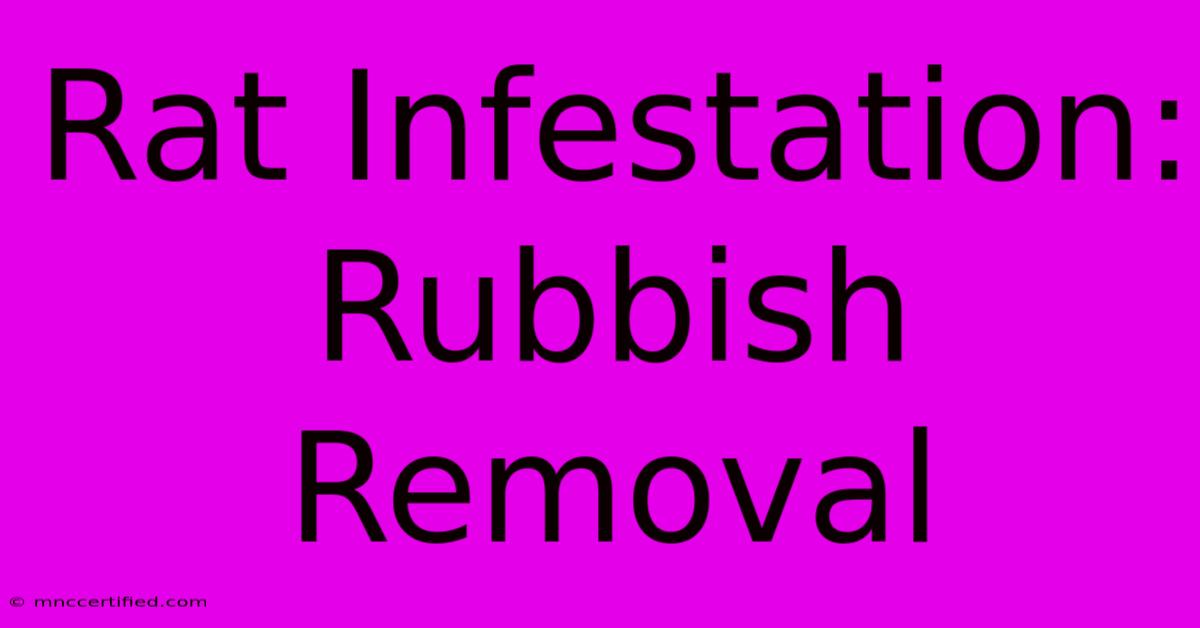Rat Infestation: Rubbish Removal

Table of Contents
Rat Infestation: The Critical Role of Rubbish Removal
Rats. Just the word sends shivers down most people's spines. A rat infestation isn't just unpleasant; it's a serious health hazard, posing risks of disease transmission and property damage. While there are many ways to tackle a rat problem, one crucial step often overlooked is rubbish removal. Effective rubbish removal is a cornerstone of rat prevention and control. This article will explore the critical link between rubbish and rat infestations, offering practical advice on how proper waste disposal can significantly reduce your risk.
The Connection Between Rubbish and Rat Infestations
Rats are opportunistic creatures, thriving in environments with readily available food and shelter. Your rubbish is a buffet and a five-star hotel for them. Food scraps, discarded packaging, and even compost can attract rats in droves. The more rubbish you have lying around, the more appealing your property becomes to these unwanted guests.
What Attracts Rats to Your Rubbish?
- Food Waste: Leftover food, spoiled produce, and pet food are all irresistible to rats. Even seemingly insignificant crumbs can attract them.
- Packaging: Cardboard boxes, plastic containers, and paper bags provide excellent nesting materials and hiding places.
- Unsecured Bins: Overfilled or poorly maintained bins are easily accessed by rats, offering them a convenient source of food and shelter.
- Compost Piles: While composting is environmentally friendly, improperly managed compost heaps can become rat havens.
Preventing Rat Infestations Through Effective Rubbish Removal
Proactive rubbish removal is your first line of defense against a rat infestation. Here's how to minimize the risk:
1. Regular Rubbish Removal: A Must-Do
The frequency of rubbish removal depends on the amount of waste you generate. However, regular and timely disposal is crucial. Don't let rubbish pile up—it's an open invitation to rats.
2. Secure Your Rubbish Bins: The Importance of Proper Containment
Invest in robust, well-maintained rubbish bins with tight-fitting lids. Regularly check for any damage and repair or replace them promptly. Consider using heavy-duty bins designed to deter rodent access.
3. Proper Food Storage: Minimizing Accessible Food Sources
Store food securely in airtight containers to prevent rats from accessing it. This includes pet food, which should be stored in sealed containers and cleaned up regularly. Sweep up crumbs and spills immediately.
4. Compost Management: Safe and Responsible Composting
If you compost, ensure your compost bin is rat-proof. Use a bin with a secure lid and regularly turn the compost to reduce moisture and prevent the build-up of appealing smells.
5. Cleanliness is Key: Maintaining a Tidy Environment
Regularly clean your property, removing any potential food sources or clutter that could attract rats. Keep your yard tidy, eliminating overgrown vegetation that can provide rats with shelter.
When to Call in the Professionals: Pest Control Services
Despite your best efforts, a rat infestation may already exist. If you're seeing signs of rats, such as droppings, gnaw marks, or unusual noises, don't delay. Contact a professional pest control service. They have the expertise and tools to effectively eliminate the infestation and offer advice on preventing future problems.
Conclusion: Rubbish Removal – Your First Line of Defense
Remember, rubbish removal is not just about keeping your property clean; it's a vital step in preventing rat infestations. By implementing the strategies outlined above, you can significantly reduce the risk of a rat problem and safeguard your home and health. Don't underestimate the power of proactive rubbish management in protecting your property from these unwelcome guests.
Keywords: Rat Infestation, Rubbish Removal, Rat Control, Pest Control, Rodent Prevention, Waste Disposal, Garbage Removal, Cleanliness, Home Hygiene, Rat Prevention Tips, Pest Control Services.

Thank you for visiting our website wich cover about Rat Infestation: Rubbish Removal. We hope the information provided has been useful to you. Feel free to contact us if you have any questions or need further assistance. See you next time and dont miss to bookmark.
Featured Posts
-
Itvs I M A Celebrity Dean Mc Cullough
Nov 18, 2024
-
Itvs I M A Celeb Casting Mistake
Nov 18, 2024
-
Fighting Illini Re Enter Top 25
Nov 18, 2024
-
49ers Injury News Kittle Vs Seahawks
Nov 18, 2024
-
Tresemme Keratin Repair Bond Plex
Nov 18, 2024